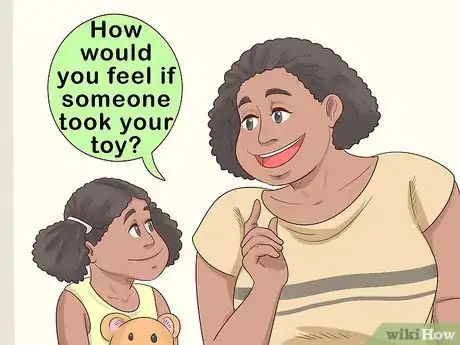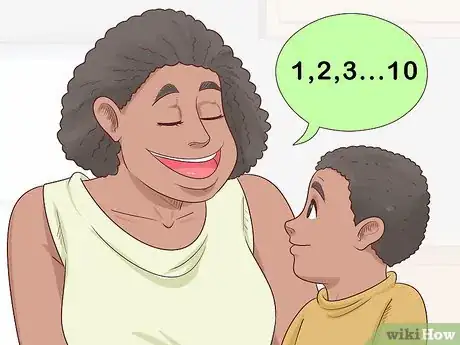This article was co-authored by Dr. Niall Geoghegan, PsyD. Dr. Niall Geoghegan is a Clinical Psychologist in Berkeley, CA. He specializes in Coherence Therapy and works with clients on anxiety, depression, anger management, and weight loss among other issues. He received his Doctorate in Clinical Psychology from the Wright Institute in Berkeley, CA.
There are 19 references cited in this article, which can be found at the bottom of the page.
This article has been viewed 33,999 times.
Emotional health is a trickier topic than sniffles and skinned knees. If you have a toddler, teach them what emotions are, how to manage their feelings, and how to empathize with others. As your child matures, encourage them to share their feelings with you, and be a good role model by keeping your own emotions in check.[1] While you need to ensure they're safe, independence is a key aspect of emotional health. It might be tough to hold back, but letting your child do things on their own can help them become a confident, well-adjusted adult.
Steps
Building a Strong Bond
-
1Tell your child you love them. Regardless of the emotions your child is experiencing, make sure that you tell them that you love them. It is important for children to hear this. How often you say “I love you” is up to you, but it is important for your child to hear these words sometimes.[2]
- For example, you might tell your child that you love them before you tuck them into bed at night, or you might tell them when they are feeling sad or mad.
-
2Set aside time every day for quality conversations.[3] Good times to talk might be on way to school, during breakfast or dinner, or before bed. When you chat, ask your child specific questions about their day instead of general yes or no questions. While you don't want to come off as intrusive, open-ended questions can help convey your interest and spark the conversation.[4]
- For example, instead of asking, “Did you have a good day,” ask, “What was the coolest thing you learned at school,” or “What's something funny that happened today?”
- Your child will be more likely to confide in you if you regularly spend quality time together.
- If you think they're dealing with a problem, avoid pushing them to tell you. Instead of making demands, let them know they can trust you, and say, “I'm happy to listen or offer advice if you need it.” They might feel more comfortable talking about difficult topics if you give them some space.
Advertisement -
3Develop family rituals, such as shared meals and weekend outings. Family rituals and routines can solidify your bond and offer your child a sense of stability. Try to eat breakfast or dinner together daily, or as often as your schedules allow. On the weekends, you could go for bike rides or hikes, or go to ball games together.[5]
- Learn about your child's interests, and do things together related to those interests. If they love music, go to a concert together. If they're passionate about baseball, go to college or professional games whenever possible.
- Let your child pick the activities, within reason. They might be more likely get excited about spending quality time together when they're allowed to make decisions. Keep in mind that doesn't mean you need to break the bank to do a costly activity.[6]
-
4Encourage your child to discuss difficult topics with you. It might seem easier to avoid talking about complex emotions and stressful incidents. However, resist the urge to brush tough subjects under the rug.[7] If your child is coping with an emotional struggle, like being bullied or a death in the family, gently ask them to share their feelings with you.[8]
- Suppose they're having problems with a peer at school. When you pick them up and they seem withdrawn, ask, “Did Sam say mean things to you again? Would you like to talk about it? You know, talking about your feelings instead of bottling them up might help you feel better.”
- Your child might be shy about discussing their feelings or not have the words to tell their story. Saying, “You seem sad,” or asking, “Did that make you feel angry,” can help them learn how to understand and express their emotions.
-
5Help them find an outlet if they don't want to confide in you. You might have a strong bond, but it's not always easy to share things with a parent. If you know something's on their mind and they won't open up, encourage them to spend time with a trusted loved one. For instance, they might have an easier time confiding in an aunt, uncle, grandparent, or close family friend.[9]
- Don't take it personally if your child doesn't want to open up to you. Whether they're getting bullied or having trouble with their grades, some subjects are tough to discuss with parents. They're better off talking to someone else than bottling up their feelings.
- If they open up to a trusted loved one, it's best to respect their privacy. If they're not in danger or breaking the law, respecting their boundaries is the healthiest option.
Teaching Your Kids about Emotions
-
1Label emotions for your toddler or preschooler. When your child first starts learning to talk, start teaching them basic emotions, such as happy, sad, angry, and afraid. Children's books, drawings of smiley or sad faces, and making exaggerated facial expressions are great ways to teach your kids how to recognize emotions.[10]
- For instance, point at a drawing and say, “Kitty won a prize and is happy,” or ask, “What do you think this face means?”
- Songs and games such as “When you're happy and you know it, clap your hands” can help them connect actions with emotions.
- In addition to helping them recognize others' emotions, ask your child how they might help a sad or angry character. Ask, for example, “Kitty took doggie's toys, and doggie is sad. How can we help doggie feel better?”
-
2Acknowledge your child's feelings when they're upset. Young children throw tantrums when they experience an overwhelming emotion that they can't express in words. Instead of just telling your child to be quiet when they're upset, help them use their words. Let them know that you want to help, but remind them that you can only understand them if they use their nice voice.[11]
- If you child is crying because they want a toy, say, “I know you're sad because you want the toy, and I want to help. Maybe if you use your nice voice we can find a fun game to play.”
- Make sure to teach your child that there are appropriate places and inappropriate places for displays of emotion. For example, it is inappropriate for your child to have a temper tantrum in a public place. Let them know that if they feel angry, they need to tell you that.
-
3Ask your kids to talk about their feelings. To lay a foundation when they're young, ask your child how they feel in various situations. Discuss their day at preschool or dance class, and ask questions such as, “How did you feel when Sally took your toy?” As they grow up, remind them throughout their middle school and adolescent years that they can always come to you to vent or ask for advice.[12]
- No matter their age, remember to always give your child your undivided attention during conversations. Don't play on your phone or answer emails when they're telling you about their feelings.
- Sometimes, you might need to resist the urge to scold or lecture. For example, suppose your child has a bad attitude during dinner. Instead of scolding them for being fresh, try asking why they're upset. Comfort them, if necessary, and stress that it's better to talk about feelings instead of holding them in and making a scene.[13]
-
4Set a good example by regulating your own emotions. Children of all ages look up to their parents, so model self-control for your kids. Avoid blowing your top, slamming doors, throwing things, and other hostile behavior. If you and your spouse or co-parent have a disagreement in front of your kids, stay calm and resolve it in private instead of screaming and hurling insults.[14]
- Regulating your emotions doesn't mean you should act like a robot in front of your kids. It's good to express emotions in front of them, whether you're elated or upset.
- However, you should demonstrate self-control in the moment, such as by taking deep breaths or counting to 10. In the long-term, you can blow off steam by exercising, listening to music, or writing.
- If your kids are around when you are working on calming yourself down, explain to them what you are doing. Say something like, "Mommy had a bad day at work, so she is going to take some deep breaths to make the mad feelings go away." Then, take deep breaths and tell your child when you feel better.
-
5Teach them about accountability and empathy when they hurt others. If your child misbehaves, seize the opportunity to teach them how to make amends. It's especially important to teach younger children how to empathize with others. If you have a toddler or preschooler, help them understand how their actions affect others' emotions.[15]
- If your child steals a toy, explain that their actions have consequences and they need to say that they're sorry. Ask, “How would you feel if someone took your toy? Wouldn't you be sad? That's how you made Sam feel.”
- When one child hurts another, make sure to give lots of affection to the one who was hurt. Say, “Oh I'm so sorry that Sally took your toy! That wasn't very nice, and I know it makes you very sad.” Modeling empathy can help the other child understand that they shouldn't hurt others.
Helping Your Kids Cope with Emotions
-
1Explain that it's okay to experience negative emotions. Tell your kids that it's important to accept feelings like anger, sadness, frustration, and jealousy. Everyone experiences them, so they shouldn't try to bury them or pretend they don't exist. Although negative emotions are normal, make it clear that allowing ourselves to feel them doesn't mean we should let them control our behavior.[16]
- Say, it's okay to feel angry or mad. Everyone gets angry. But it's never okay to break things, hit others, or call people mean names.” Remind your child that their emotions do not control them. They control their emotions and can respond to them in positive ways.
- You can help your child learn how to name their emotions by teaching them how the emotion might make them feel physically, such as clenching their fists if they feel mad or a heaviness in their chest when they feel sad.
- Make sure to use simple words to describe emotions when you talk with your kids about them. Use the words glad, mad, scared, and sad.
-
2Teach them how to cool down when they're angry. Provide your younger child with coping tools, and continue to reinforce these tools as they mature. Ways of dealing with anger or frustration include taking deep breaths, counting to 10, and drawing a picture of their frustration.[17]
- Tell your child, “When you're angry, it's important to stay in control of your actions. Instead of yelling or hitting, we can take deep breaths to relax, sing a song, or draw a picture of why we're angry.”
- If you child is acting angry, ask them where in their body they feel the emotion. Then, offer to let them hit a pillow and make noises to express their mad feelings. At a certain point, your child might start to giggle and seem to feel better. Ask them where the mad went to engage them in problem-solving about expressing their emotions.
-
3Suggest healthy ways of expressing sadness. Let your kids know that, like all emotions, sadness and grief go away in time. Explain that allowing themselves to experience sadness is healthier than pretending it doesn't exist. Tell them that crying, talking about why they're sad, and doing relaxing activities can help them feel better.[18]
- Say, “It's okay to cry when you're sad. It helps to get the sad feelings out. If you need a hug, ask for one. Talking about why you're sad with someone who cares for you could help you feel better. But, if you want to be by yourself and listen to music, that's okay, too.”
- Grief and loss can be difficult emotions for children to process. If a pet dies or a relative passes away, drawing pictures, looking at photographs, creating scrapbooks, making memorials, and telling stories are helpful outlets for grief.
- Try showing your child the movie Inside Out and use it as a way to talk with your child about emotions and explain how those emotions affect them physically.
-
4Encourage them to find solutions when they're stressed or worried. From math tests to making friends, being a kid can be stressful. Assure your child that stress and worry are normal, but they need to keep things in perspective. Instead of letting stress and worry overwhelm them, teach them how to come up with solutions to the challenges they face.[19]
- Offer advice such as, “Sometimes problems seem overwhelming, but many challenges are temporary and solvable. When a situation seems too big to handle, break it up into small, doable steps. Remind yourself, "I can do this".
- Assure them that, “I'm always here for you, too. When you find yourself in a tough situation and don't know what to do, come to me. We can find a solution together.”
- Try to resist urges to solve your child's problems for them. When they need help, find solutions with them instead of for them. Encouraging your child to solve problems independently can help them develop emotional resilience. That way, as adults, they'll have the tools needed to manage anger, frustration, worry, and other intense emotions.
- You may also want to teach your child how to use a grounding exercise, such as the 5-4-3-2-1 exercise. Have your child name 5 things they can see, 4 things they can touch, 3 things they can hear, 2 things they can smell, and 1 good thing. After your child is calm, then you can talk with them about their emotions.
-
5Watch for signs of stress in your child. Your child might not recognize that they are feeling stressed, so make sure that you are on the lookout for it. Then, you can teach your child how to recognize these signs as well. Some common physical signs of stress include:[20]
- Crying or seeming extra moody
- Acting clingy or frightened
- Sleeping too much or not enough
- Overeating or undereating
- Avoiding parents and/or friends
- Showing hostility towards adults and other kids
- Expressing worries or complaining more than usual
Balancing Boundaries and Freedom
-
1Help your child learn how to perform tasks to build their confidence. Self-confidence is the foundation of resilience, which is the ability to cope with life's challenges. An independent, confident person can manage their emotions and handle setbacks. As early as possible, begin teaching them age-appropriate skills and chores.[21]
- For example, teach your preschooler how to tie their shoes and pick out their outfits, let your middle schooler help out in the kitchen, and teach your teen how to drive. Allow your preteen or teen to have a say in how and when to complete tasks, such as doing homework, taking out the trash, or cleaning their room.
- Confidence and resilience are key aspects of emotional health. When a confident, independent person faces a struggle, they're more likely to persevere instead of letting fear, anger, or sadness overwhelm them.
- Keep in mind this doesn't mean that you shouldn't supervise your child or put them in danger. For instance, if your kindergartner helps you in the kitchen, don't let them use a sharp object or touch the stove.
-
2Respect your child's personal boundaries. Your child needs an increasing amount of privacy, freedom, and independence as they mature. Respecting these needs can teach your child to set and enforce their own boundaries, and to respect the boundaries of others.[22]
- Self-respect and respect for others are invaluable life skills. An emotionally healthy person enforces boundaries and doesn't let others take advantage of their emotions. They also understand that their actions impact the emotions of other people.
- For example, if your young child doesn't want to be tickled, respect their wishes. Your teen, for instance, has a right to ask you to knock before entering their room. Respect their boundaries, unless you suspect they're in danger or violating your trust.
-
3Work with other co-parents to set fair, consistent rules. Make sure you and any other co-parents are on the same page when it comes to discipline. Children are more likely to respect rules that are predictable and consistent. When rules are inconsistent or unreasonable, kids are more likely to become angry and push back against authority.[23]
- For example, suppose you work at night and your spouse lets your child stay up hours past their bedtime watching inappropriate TV shows. Tell your spouse, “We need to get on the same page. If we don't enforce the same rules, our child isn't going to respect our authority.”
- If you and your child's other parent aren't together, try to establish the same rules and consequences in both of your households. This will set up consistent, predictable expectations for your child, and help prevent a situation where one parent is more lenient than the other.
-
4Limit your child's screen time. Phones, computers, and video games can cut into quality family time, schoolwork, sleep, and extracurricular activities. Additionally, cyber-bullying is widespread on social media, and advertisements, TV shows, and movies are packed with unrealistic beauty and lifestyle standards. Try to limit screen time to 2 hours per day or less, designate phone-free zones, and avoid keeping a computer or TV in your child's room.[24]
- Make it a rule that your child has to keep their phone in a common area overnight instead of taking it to bed. During family meals, set a no-phone rule. More time for quality communication can encourage your child to open up to you about their emotions.
- Be sure to follow your own screen time rules. Don't play on your phone during dinner, or text while your child is telling you about their day.
- Keep in mind strict screen time rules can make your child feel excluded at school. It might be helpful to talk to their teachers or friends' parents about general guidelines for cell phones and social media use.
-
5Deliver reasonable consequences related to a broken rule. Natural consequences, or the direct results of misbehavior, are great teaching tools. When rule-breaking doesn't lead to a natural consequence, come up with a punishment that's related to the behavior. Unreasonable consequences, on the other hand, can lead to emotional mismanagement, including angry outbursts, resentment, and contempt for authority.[25]
- For example, if they ditched practice to hang out with friends, the natural consequence is that they get kicked off of the team.
- If your preschooler colors on the walls, make them clean it up, and take their crayons away for the rest of the day. If your teen stays out past their curfew, ground them for a weekend or set a curfew that's an hour earlier.
- Your aim should be to correct the behavior, not vent your frustrations. Screaming at them or issuing a harsh punishment that's not related to the broken rule aren't effective teaching tools.
-
6Teach your child about taking good care of themselves. Self-care is an important part of emotional well-being, so make sure that you discuss this with your child and model good self-care for them. Let them know that it is important for them to take time to practice self-care.
- For example, you could model self-care by giving yourself a manicure, or by taking a long bath once per week. Let your child know that they can devote time to self-care in this way, too.
- Self-care may also include setting aside time for a favorite hobby, such as reading, knitting, or going for a hike.
Expert Q&A
-
QuestionHow can I help my child with emotions?
 Dr. Niall Geoghegan, PsyDDr. Niall Geoghegan is a Clinical Psychologist in Berkeley, CA. He specializes in Coherence Therapy and works with clients on anxiety, depression, anger management, and weight loss among other issues. He received his Doctorate in Clinical Psychology from the Wright Institute in Berkeley, CA.
Dr. Niall Geoghegan, PsyDDr. Niall Geoghegan is a Clinical Psychologist in Berkeley, CA. He specializes in Coherence Therapy and works with clients on anxiety, depression, anger management, and weight loss among other issues. He received his Doctorate in Clinical Psychology from the Wright Institute in Berkeley, CA.
Clinical Psychologist Start by modeling healthy emotions and emotional processing for your child. Additionally, encourage your child to open up to you about their feelings so you can help them handle their emotions.
Start by modeling healthy emotions and emotional processing for your child. Additionally, encourage your child to open up to you about their feelings so you can help them handle their emotions.
Warnings
- All children go through struggles. However, it might be best to call a mental health professional if you've noticed concerning signs, such as extreme shifts in behavior, loss of interests in normal activities, sudden weight changes, or trouble with the law.⧼thumbs_response⧽
References
- ↑ Dr. Niall Geoghegan, PsyD. Clinical Psychologist. Expert Interview. 24 July 2019.
- ↑ https://www.parenting.com/blogs/parenting-post/how-often-do-you-say-i-love-you-your-kids
- ↑ Dr. Niall Geoghegan, PsyD. Clinical Psychologist. Expert Interview. 24 July 2019.
- ↑ http://www.apa.org/helpcenter/communication-parents.aspx
- ↑ http://www.apa.org/pi/families/resources/parents-caregivers.aspx
- ↑ https://www.psychologytoday.com/us/blog/compassion-matters/201211/7-tips-raising-emotionally-healthy-child
- ↑ Dr. Niall Geoghegan, PsyD. Clinical Psychologist. Expert Interview. 24 July 2019.
- ↑ https://www.psychologytoday.com/us/blog/compassion-matters/201201/tips-helping-kids-handle-their-emotions
- ↑ https://www.psychologytoday.com/us/blog/compassion-matters/201211/7-tips-raising-emotionally-healthy-child
- ↑ http://csefel.vanderbilt.edu/documents/teaching_emotions.pdf
- ↑ http://csefel.vanderbilt.edu/documents/teaching_your_child-feeling.pdf
- ↑ http://www.apa.org/helpcenter/communication-parents.aspx
- ↑ https://www.psychologytoday.com/us/blog/compassion-matters/201211/7-tips-raising-emotionally-healthy-child
- ↑ https://my.vanderbilt.edu/developmentalpsychologyblog/2014/05/parental-influence-on-the-emotional-development-of-children/
- ↑ https://mcc.gse.harvard.edu/parenting-resources-raising-caring-ethical-children/raising-caring-children
- ↑ https://greatergood.berkeley.edu/article/item/emotion_coaching_one_of_the_most_important_parenting_practices_in_the_histo
- ↑ https://www.zerotothree.org/resources/294-first-feelings-the-foundation-of-healthy-development-starting-from-birth
- ↑ https://childmind.org/article/helping-children-deal-grief/
- ↑ https://kidshealth.org/en/parents/worrying.html?WT.ac=ctg
- ↑ http://www.apa.org/helpcenter/stress-children.aspx
- ↑ https://www.healthychildren.org/English/healthy-living/emotional-wellness/Building-Resilience/Pages/Building-Resilience-in-Children.aspx
- ↑ https://psychcentral.com/lib/how-to-raise-emotionally-healthy-children/
- ↑ https://psychcentral.com/lib/how-to-raise-emotionally-healthy-children/
- ↑ https://www.healthychildren.org/English/family-life/Media/Pages/Where-We-Stand-TV-Viewing-Time.aspx
- ↑ https://www.ncbi.nlm.nih.gov/pmc/articles/PMC2719514/













































































